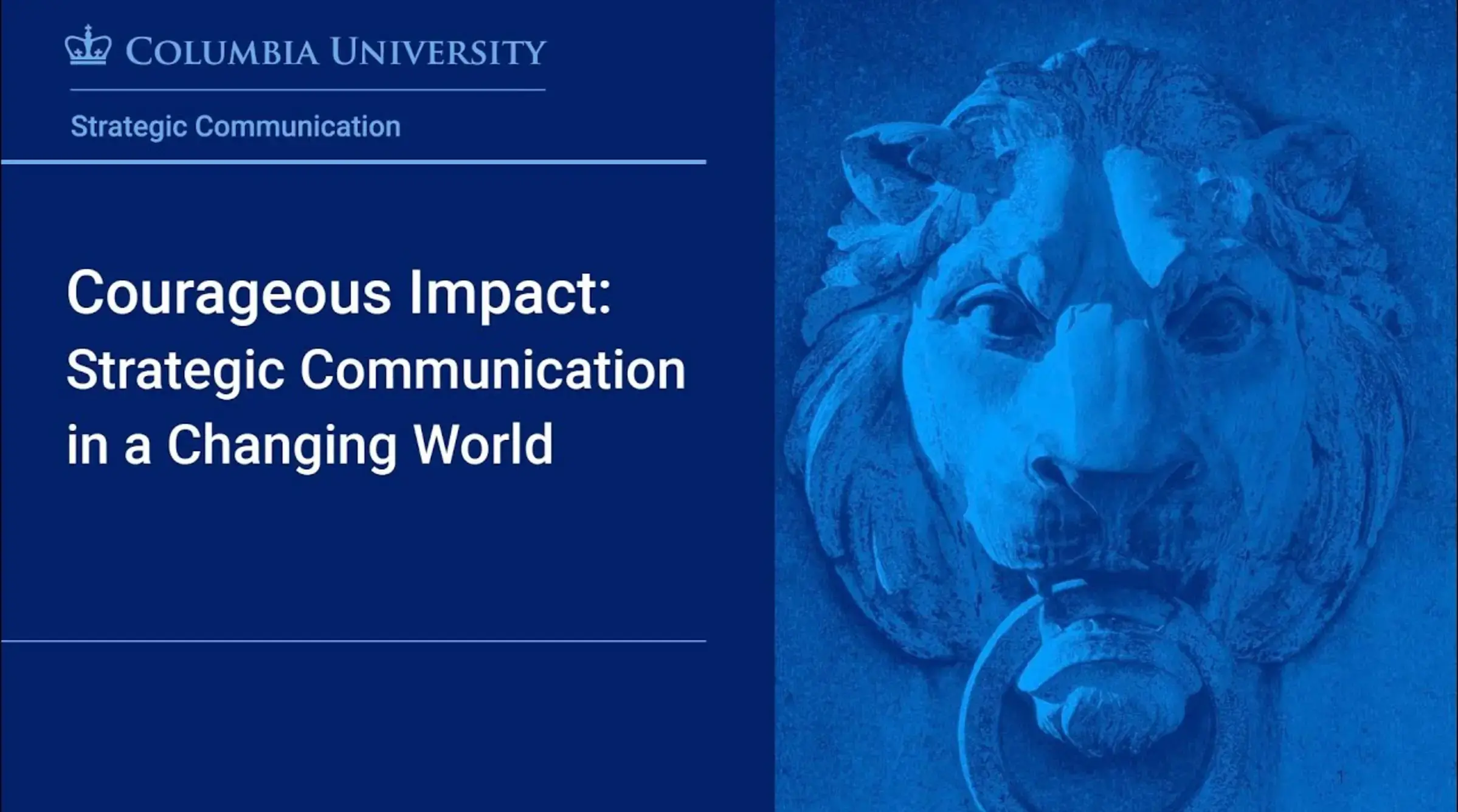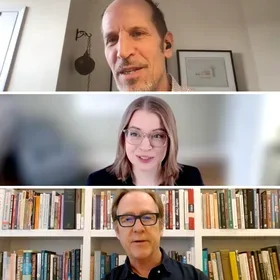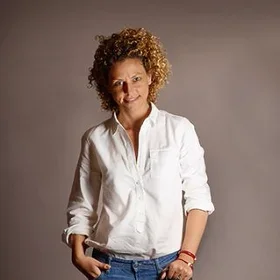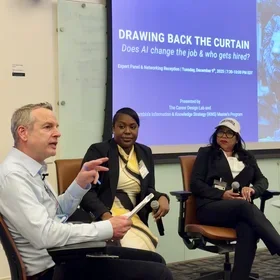By Shana Childs (’14JRN)
More than 155 faculty members, students, alumni, and guests convened on January 20 for the first-ever Winter Symposium hosted by the M.S. in Strategic Communication program at the Columbia University School of Professional Studies (SPS). In focus: how strategic communication can be a vehicle for courageous impact in a changing world.
SPS Dean Troy Eggers set the tone in his opening remarks with a charge specifically for students and alumni. “I hope that the graduates will use their talents for the fourth purpose of the university: to advance human welfare and address the great challenges of our times.” Jesse Scinto, the deputy director of the program, added, “Although many of us think of strategic communication as a job, it’s also a noble pursuit. At its heart is the right to speak freely and persuasively, to advocate for ourselves and for a better future, and to settle our differences amicably.”
Guest speakers from Adweek, the ASPCA, the Atlantic Council, Columbia, Meta, the United Nations, and other organizations discussed emerging and best practices in communication as they relate to a range of issues, including Ukraine’s influence campaign in its war with Russia, animal welfare, reproductive choice, climate change, and even the metaverse. The agenda: a keynote by author and climate change activist David Fenton; topical deep dives; complimentary lunch; a plenary panel; leadership development sessions; student capstone project presentations; and a networking reception in the evening.
In the keynote address, Fenton presented sobering facts about climate change and Americans’ understanding of it, and he called for clearer and bolder communication about what can be done. According to NASA projections, sea levels near U.S. coasts will rise by ten to twelve inches in thirty years, exacerbating flooding, disruptions in sea life, and other threats emerging from more extreme weather.
“Dealing with the climate crisis has been a failure of public opinion,” he said. But it doesn’t have to stay that way, he argued, calling for a number of solutions:
- Craft simple messages that everyone can understand. “Facts don’t persuade people unless they’re embedded in storytelling, really moral narratives. We have to frame this as a struggle between good and evil; we have to seize the moral high ground.”
- Repeat, repeat, repeat those messages. “It’s only when you’re sick to death of hearing your own message that someone has actually heard it.”
- Recruit well-known and effective spokespeople to advocate for climate action. People with similar ideologies listen to each other, so find people who can speak to their own groups.
- Climate action advocates need to create and use a mobilization platform. “If you were to go online to look for a way to take action on climate change, where would you go? The answer really is nowhere, and that’s nuts!”
In the afternoon, concurrent leadership development sessions offered insights for communication professionals seeking to advance their careers through nonprofit boards; mentoring; public service; and diversity, equity, and inclusion.
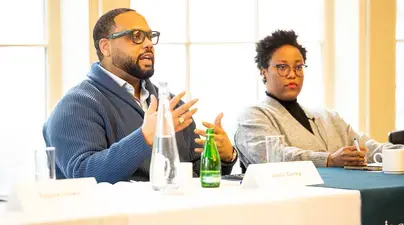
Above: Jason Dailey, Director, Head of Agency, Meta (left), and Courtney D. Cogburn, Ph.D. (right), Associate Professor, Columbia University School of Social Work and Creator of the 1000 Cut Journey, discussed the ethical questions emerging as metaverses are built.
Current students closed the formal portion of the symposium with presentations of their capstone projects, followed by a networking reception. Required of all students in the M.S. program, the capstone organizes students into teams that develop and present a comprehensive communication solution for a sponsor organization’s real-world business problem or opportunity. Students have recently presented to clients such as Casper, L'Oréal, and PBS. Strategic Communication Lecturer Lilian Ore, Ed.D., emceed during the showcase.
- “Casper: Sweet Dreams Are Made of This,” presented by Theodora Anastasiou (’24SPS), Valeria Corallo (’24SPS), Mira Hallock (’24SPS), and Joseph Hanson (’24SPS)
- “Illuminate Case Analysis and Recommendations,” presented by Justine Mrsich (’23SPS)
- “Fairplay for Kids,” presented by Boris Koehoorn (’23SPS)
- “Mane Solutions—L'Oréal,” presented by Qianxu Ding (’23SPS) and Lorenzo Brogi-Skoskiewicz (’23SPS)
- “PBS All Arts,” presented by Ashley All (’23SPS), Jennah Blau (’23SPS), and Maddy Cole (’23SPS)
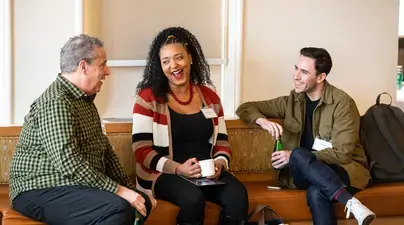
Above: Attendees networked over a complimentary lunch and networking reception in the evening.
About the M.S. in Strategic Communication Program
The business world’s around-the-clock communications challenges are demanding a new level of strategic thinking. Columbia University’s Master of Science in Strategic Communication graduates emerge equipped with all the essential skills and tools for a successful career in a wide range of communication fields. The program is available in three formats for professionals of varying experience levels and locations: the Executive M.S., for experienced (6+ years) communication leaders (36 credits in 16 months for degree completion); Full-Time M.S., for early-career communication professionals and career changers (36 credits in 12 to 16 months for degree completion); and Part-Time M.S., for working professionals looking for flexibility (36 credits in 24 months to 3 years for degree completion).
Application deadlines for fall 2023 enrollment are quickly approaching. Visit the admissions deadlines pages for your chosen format for dates: Executive M.S.; Full-Time M.S.; and Part-Time M.S
